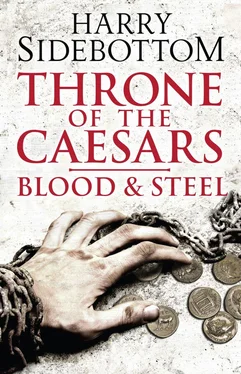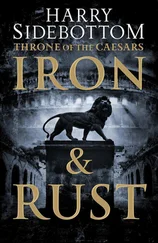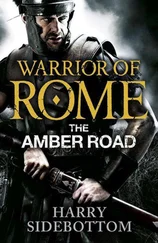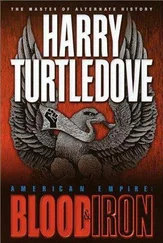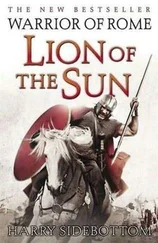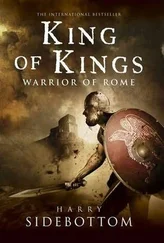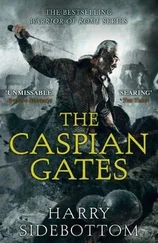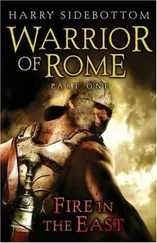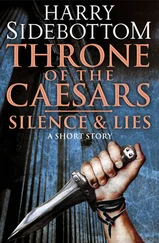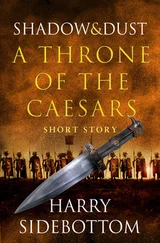Harry Sidebottom - Blood and Steel
Здесь есть возможность читать онлайн «Harry Sidebottom - Blood and Steel» — ознакомительный отрывок электронной книги совершенно бесплатно, а после прочтения отрывка купить полную версию. В некоторых случаях можно слушать аудио, скачать через торрент в формате fb2 и присутствует краткое содержание. Год выпуска: 2015, ISBN: 2015, Издательство: HarperCollins Publishers, Жанр: Исторические приключения, на английском языке. Описание произведения, (предисловие) а так же отзывы посетителей доступны на портале библиотеки ЛибКат.
- Название:Blood and Steel
- Автор:
- Издательство:HarperCollins Publishers
- Жанр:
- Год:2015
- ISBN:9780007499908
- Рейтинг книги:3 / 5. Голосов: 1
-
Избранное:Добавить в избранное
- Отзывы:
-
Ваша оценка:
- 60
- 1
- 2
- 3
- 4
- 5
Blood and Steel: краткое содержание, описание и аннотация
Предлагаем к чтению аннотацию, описание, краткое содержание или предисловие (зависит от того, что написал сам автор книги «Blood and Steel»). Если вы не нашли необходимую информацию о книге — напишите в комментариях, мы постараемся отыскать её.
Blood and Steel — читать онлайн ознакомительный отрывок
Ниже представлен текст книги, разбитый по страницам. Система сохранения места последней прочитанной страницы, позволяет с удобством читать онлайн бесплатно книгу «Blood and Steel», без необходимости каждый раз заново искать на чём Вы остановились. Поставьте закладку, и сможете в любой момент перейти на страницу, на которой закончили чтение.
Интервал:
Закладка:
Curule Chairs : Ivory folding stool, the mark of office of important Roman officials.
Custos : Latin, literally ‘a guardian’; a male attendant would accompany an upper-class woman, in addition to her maids, when she went out in public.
Cynic : The counter-cultural philosophy founded by Diogenes of Sinope in the fourth century BC; its adherents were popularly associated with dogs (the name itself is from the Greek for ‘dog’) for their barking and snapping at contemporary morality and social customs.
Cyrenaica : Roman province of eastern Libya and the Island of Crete.
Cyrene : City originally founded by Greek settlers near modern Shahhat on the northeastern coast of Libya.
Dacia : Roman province north of the Danube, in the region around modern Romania.
Daemon : Supernatural being; could be applied to many different types: good/bad, individual/collective, internal/external, and ghosts.
Dalmatia : Roman province along the eastern shore of the Adriatic.
Damocles : In Greek mythology, punished in the afterlife by having a sword hung from a thread suspended over his head.
Darics : Ancient system of weighing precious metals based on a standard Persian gold coin, the Daric. Roughly 8.4g.
Decii : Members of the Decius family.
Decurion : A junior Roman cavalry officer in charge of a squadron of around 30 troopers.
Decus et Tutamen : Latin, literally ‘honour and safeguard’.
Delphix : From the tripod tables, originally designed in Delphi, that furnished imperial dining rooms.
Demavend : The highest mountain in Parthia, prominent in Persian culture and mythology; located in northern Iran.
Demiurge : In some Greek philosophical systems, the divine figure that fashioned (but did not necessarily create) the Cosmos.
Denarii (singular Denarius ): A Roman silver coin; originally a day’s wage for a labourer, though by this period much debased.
Dignitas : Important Roman concept that covers our idea of dignity but goes much further; famously, Julius Caesar claimed that his dignitas meant more to him than life itself.
Dionysus : Greek god of wine.
Diplomata (singular Diploma ): From the Greek term for a letter folded in two; in the Roman empire, an official pass given to persons travelling in the provinces.
Diptych : A writing tablet with two leaves; those from the Emperor were often made of costly materials such as ivory and intricately carved on the outside.
Domina : Latin, ‘lady’, ‘mistress, ‘ma’am’; a title of respect.
Domus Rostrata : Home of the Republican general Pompey in the fashionable Carinae quarter; decorated with the ramming beaks (Rostra) of the pirate ships he captured, and from which it took its name.
Drafsh-i-Kavyan : The royal standard of the Sassanid Kings, encrusted with jewels and showing a star on a purple field, claimed to have mythical origins.
Dravus river : The modern Drava, rising in the Alps and flowing eastwards to the Danube.
Dreinos river : The modern Drina, a tributary of the Danube, forming the northern border between Bosnia-Herzegovina and Serbia.
Druid : Priest of Celtic religion.
Eclogues : Title of a collection of poems by Virgil; from the Greek ekloge, ‘extracts’.
Edessa : Frontier city periodically administered by Rome, Parthia and Armenia in the course of the third century; modern Anhurfa in southern Turkey.
Edessenes : People from Edessa.
Elysian Fields : In Greek mythology, the heaven that awaits the souls of heroes and the virtuous.
Emesa : Modern Homs in Syria.
Emesenes : Inhabitants of the city of Emesa and surrounding area, modern Homs in Syria.
Emona : Modern Ljubljana in Slovenia.
Ephesus : Major city founded by Greek colonists on the western coast of modern Turkey.
Epicureanism : Greek philosophical system, whose followers either denied that the gods existed or held that they were far away and did not intervene in the affairs of mankind.
Epilogue : In ancient rhetoric, the conclusion of a speech; from Greek ‘to say in addition’.
Epiphany : The visual manifestation of a deity; in sun-worship, the dawn is thus an epiphany.
Equestrian : Second rank down in the Roman social pyramid; the elite order just below the senators.
Equirria : Roman chariot or horse racing festival sacred to Mars, celebrated on the day before the Ides of March.
Equites Indigenae Sagittarii : Regular unit of native horse archers, often recruited along the eastern frontiers of the Roman Empire.
Equites Singulares Augusti : Mounted unit protecting the Emperor.
Esquiline : One of the seven hills of Rome, rising east of the Roman Forum.
Esuba : Ancient village in North Africa, location uncertain.
Eternal City : Nickname given to the city of Rome.
Etruria : Region of Italy to the northwest of Rome; roughly modern Tuscany.
Eulogy : In ancient rhetoric, a speech in praise of someone; from the Greek ‘good language’.
Exedra : In ancient architecture, a semi-circular recess.
Exemplum : Latin, ‘example’.
Exordium : In ancient rhetoric, the introduction of a speech.
Factio : Latin, ‘political faction’.
Falernian : Very expensive white wine from northern Campania, particularly prized by the Romans.
Familia : A Roman household; for the well-off, this included slaves and other dependents; that of the Emperor comprised both servants and the imperial bureaucracy; largely staffed by slaves and freedmen.
Fanum Fortunae : Modern Fano, on the northeastern shore of the Italian peninsula.
Fasces : Bundles of rods for beating malefactors tied around an executioner’s axe; symbol of a Roman magistrate’s or Emperor’s authority.
Father of the Country : Honorific title bestowed very rarely in the Roman Republic on outstanding individuals for saving the state; in the imperial period, increasingly became a standard title claimed by Roman Emperors at accession.
Father of the House : The most senior Senator.
Fiscus : Originally the Emperor’s privy purse; took over the functions of the state treasury.
Flaminia : Ancient region of Italy to the northeast of Rome on the Adriatic side of the Apennines.
Flavian Amphitheatre : Giant arena for gladiatorial fights seating 60,000 spectators; now known as the Coliseum, in antiquity known after the Flavian dynasty of Emperors who built and dedicated the structure.
Читать дальшеИнтервал:
Закладка:
Похожие книги на «Blood and Steel»
Представляем Вашему вниманию похожие книги на «Blood and Steel» списком для выбора. Мы отобрали схожую по названию и смыслу литературу в надежде предоставить читателям больше вариантов отыскать новые, интересные, ещё непрочитанные произведения.
Обсуждение, отзывы о книге «Blood and Steel» и просто собственные мнения читателей. Оставьте ваши комментарии, напишите, что Вы думаете о произведении, его смысле или главных героях. Укажите что конкретно понравилось, а что нет, и почему Вы так считаете.
